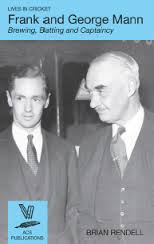Frank and George Mann – Brewing, Batting and Captaincy
Martin Chandler |Published: 2015
Pages: 128
Author: Rendell, Brian
Publisher: ACS
Rating: 3 stars

Their names are now largely forgotten, but Frank and George Mann were both England captains. Traditional amateurs both the father and son worked in the family brewing business which provided the financial backing by virtue of which they could indulge their passion for the game.
Father Frank had the longer cricket career and, on the face of matters, seems the less accomplished cricketer although there is not that much in it looking at the bare bones of their statistics. Frank captained England in South Africa in 1922/23, had a modest career average of 23 but was no mere passenger in his five Tests, twice passing fifty, averaging 35 and, most importantly, leading England to victory.
George missed six of what would have been his most productive years to World War Two, and as a result was only ever able to play for four full English summers. Averaging 25 his career record does not greatly exceed that of his father and again the Test arena brought him a richer reward, like Frank some twelve points higher.
Emulating Frank; George also led England to victory in South Africa, in 1948/49 and scored an important century along the way. Both men also led Middlesex to the County Championship. A difference between them is that George kept the England job for the visit of the 1949 New Zealanders, although he agreed to stand down for the latter two Tests of the series to enable England to look at other options to lead the side to Australia in 1950/51, a trip he was unable to commit to for business reasons.
Author Brian Rendell begins with a look at the history of the family and the brewing business which underpins the story before examining Frank Mann’s cricket career. The story proceeds on a season by season basis and, sadly, gives little by way of an assessment of Frank’s personality. There is the occasional departure from a strict examination of Frank’s cricket, but not enough to consistently hold the reader’s attention. It is unlikely to greatly interest the casual enthusiast.
Things do pick up when George comes into the story. His career began just before the war, as did that of his younger brother John, who plays a bit part in the story. Curiously when John made his First Class debut for Middlesex in 1939 against Cambridge University George, a Middlesex player too of course, was playing for the opposition. Later in the summer the brothers played together for Middlesex – it set me wondering how often two brothers have played both with and against each other in the same season, and with the publisher being the ACS there is just a tinge of disappointment that the answer is not given.
The journey through George’s career takes a similar route to that through Frank’s, and the same frustrations result albeit it is a more interesting read. It helps that Rendell lived through George’s career, so has insights and memories of his own available to weave into the story, as well as the recollections of others. An example of a disappointment arises from the Middlesex v Somerset game at Lord’s in May 1947. It was George’s first match since before the war (he had missed the whole of 1946 with an ankle injury) and he was captain. It was also the first Championship match in that remarkable summer when Middlesex romped to the title, inspired by the record-breaking feats of Denis Compton and Bill Edrich. The Somerset match itself must have been a wonderful game of cricket, the fortunes of both sides ebbing and flowing before the visitors’ last pair added 27 to enable them to snatch victory by a single wicket. The game was well worth referring to, and must have been widely reported both locally and nationally, so surely it merited more than just a description of the scorecard?
In many ways the best passages in the book deal with George’s life after his cricket career ended, both in respect of what became of the brewery business, and the role that George played in the administration of the game. There is also a welcome glimpse, albeit a fleeting one, of George the man.
As a general overview I found Frank and George Mann – Brewing, Batting and Captaincy somewhat uneven, and not entirely satisfying. But to produce an account of the lives of two lesser known England captains was a laudable aim, and despite my criticisms there is much that is good about the book, and overall it is a worthy addition to the Lives in Cricket series.






Leave a comment